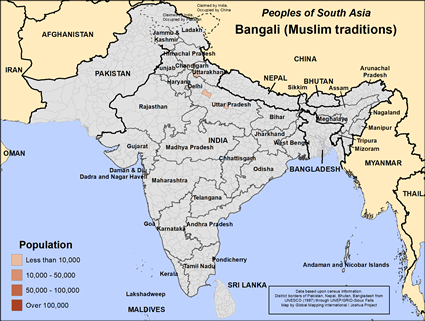Bangali (Muslim traditions) in India

Send Joshua Project a photo
of this people group. |

Map Source:
People Group data: Omid. Map geography: UNESCO / GMI. Map Design: Joshua Project
|
| People Name: | Bangali (Muslim traditions) |
| Country: | India |
| 10/40 Window: | Yes |
| Population: | 1,000 |
| World Population: | 1,000 |
| Primary Language: | Urdu |
| Primary Religion: | Islam |
| Christian Adherents: | 0.00 % |
| Evangelicals: | 0.00 % |
| Scripture: | Complete Bible |
| Ministry Resources: | Yes |
| Jesus Film: | Yes |
| Audio Recordings: | Yes |
| People Cluster: | South Asia Muslim - other |
| Affinity Bloc: | South Asian Peoples |
| Progress Level: |
|
Introduction / History
The Bangali are a semi-nomadic tribal people who live in north India. They are distinct from the large Bengali people who live in northeast India and Bangladesh. All Bangali were originally Hindus but a small group of them became Muslims during the time of the Moghuls.
The Bangali make their living by charming snakes, working as landless farm workers, in animal husbandry and by gathering forest products like roots. The Indian government has made an effort to stop their wandering ways and make them live in fixed villages.
Bangali are a Scheduled Caste, meaning they are eligible for public jobs and special consideration for university admission. Most Bangali cannot read or write. They are among the poorest peoples of north India. The main language of the Muslim Bangali is Urdu.
Where Are they Located?
Muslim Bangali live in the Indian state of Uttar Pradesh and Uttarakhand.
What Are Their Lives Like?
The Muslim Bangali live a subsistence existence in India. They travel from place to place raising their animals and trying to find day labor jobs so they can feed their families.
They sell their animals to buy food and other necessary items. They live in portable huts made of reeds and mud.
The Bangali marry within their group. Families arrange marriages. Sons inherit what little property the father possesses. Since their traditional occupation of snake charming is disappearing more and more Bangali are working as day agricultural laborers. If these jobs are few, the Bangali face the prospect of starvation.
The Indian government disapproves of their hunting animals and gathering products from the forest so that source of food is almost gone.
Caste councils settle legal disputes and promote their interests with outsiders.
The Muslim Bangali are not vegetarians but will not eat pork. Meat is normally reserved for holiday. Their main foods are rice, wheat and vegetables.
What Are Their Beliefs?
The Bangali people are Sunni, the largest branch of Islam. They mix their Islam with folk religion. The Bangali attempt to obey the teachings of the Qur 'an and the prophet Muhammad. They believe that by following the Five Pillars of Islam that they will attain heaven when they die. Sunnis pray five times a day facing Mecca. They fast the month of Ramadan. They attend mosque services on Friday. If a Muslim has the means, he or she will make a pilgrimage to Mecca once in his or her lifetime.
The two main holidays for Sunni Muslims are Eid al Fitr, the breaking of the monthly fast and Eid al Adha, the celebration of Abraham's willingness to sacrifice his son to Allah.
What Are Their Needs?
The Muslim Bangali have tremendous spiritual and physical needs. They need help in establishing permanent villages. They need help in learning new job skills and in educating their children. They would benefit by having access to clean water, electricity and modern medical care. Most of all the Bangali need to hear about Jesus Christ.
Prayer Points
Pray that the Bangali caste councils and leaders come to Jesus Christ and lead their families to Christ.
Pray that God will give them a strong desire to know the Triune God of the Bible.
Pray that God will send them believers who can help them escape their spiritual and physical poverty.